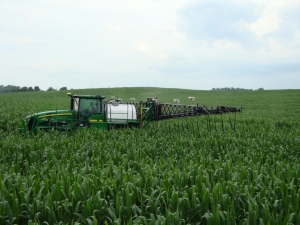
Soils naturally contain many nutrients like nitrogen, phosphorous, calcium, and potassium. These nutrients allow plants to grow. When soil nutrients are missing or in short supply, plants suffer from nutrient deficiency and stop growing. When the nutrient level is too low, the plant cannot function properly and produce the food necessary to feed the worlds’ population.
Once crops are harvested for human consumption, the natural supply of nutrients in the soil must be “re-filled”. This is why farmers add nutrients to their soils. Nutrients can be added from a variety of sources—organic matter, chemical fertilizers, and even by some plants. This maintains the soil fertility, so the farmer can continue to grow nutritious crops and healthy crops.
Farmers turn to fertilizers because these substances contain plant nutrients such as nitrogen, phosphorus, and potassium. Fertilizers are simply plant nutrients applied to agricultural fields to supplement required elements found naturally in the soil. Fertilizers have been used since the start of agriculture. Native American people used crude fertilizers, such as burying a fish in their corn plots, and organic farmers use fertilizer from natural source, such as compost. Most farmers today use fertilizers that are either mined or manufactured.
Regardless of the source of the fertilizer, all plants use the same inorganic forms of fertilizer in the soil. Sometimes the source of nitrogen can be plants called “nitrogen fixers.” Many farmers use crops, such as soybeans and alfalfa (called legumes), that can remove naturally occurring nitrogen in the atmosphere, and place (“fix”) it in the soil for future crops to use.
Fertilizer use is very expensive and can harm the environment if not used correctly. Therefore, before adding fertilizer, farmers send a soil sample to a laboratory for baseline testing. By testing their soil, farmers know which nutrients—and how much—to apply to the soil. If too little is added, crops will not produce as much as they should. If too much is added, or at the wrong time, excess nutrients will run off the fields and pollute streams and groundwater. So, while fertilizers serve an important purpose, farmers must be careful to use the right amount, at the right time, to avoid potential negative effects to the environment.
To stay healthy, humans need to acquire essential nutrients from many different food sources. The demand for food and other products from agricultural systems will increase over the next few decades. This means that we need to keep our soils healthy and full of nutrients in order to feed the growing population.
Answered by Aaron DeJoia, Duraroot
To explore more about fertilizer use, sustainability and food security, visit our sister blog Sustainable, Secure Food Blog.
To learn more, view SSSA’s Soils Support Agriculture video.
To receive notices about future blogs, be sure to subscribe to Soils Matter by clicking on the Follow button on the upper right! Explore more on our webpage About Soils. There you will find more information about Soil Basics, Community Gardens, Green Infrastructure, Green Roofs, Soil Contaminants, materials for Teachers and more.
More educational materials can be found on various SSSA websites:
http://soils4teachers.org/ (K-12 Lesson Plans and Activities)
http://soils4kids.org (Just for kids!)
http://soils.org/iys (International Year of Soils, with a coloring book and monthly ideas for teachers and scientists!)

This article is well written and easy to follow. It would be even better if the statement below is revised. Plants do not have the ability to fix atmospheric dinitrogen, but microbes.
“Regardless of the source of the fertilizer, all plants use the same inorganic forms of fertilizer in the soil. Sometimes the source of nitrogen can be plants called “nitrogen fixers.” Many farmers use crops, such as soybeans and alfalfa (called legumes), that can remove naturally occurring nitrogen in the atmosphere, and place (“fix”) it in the soil for future crops to use.”
This is a very good article. The idea of green agriculture has been put forward for many years but now the application is poor. We are a team graduate from biological and environmental science. We’ve researched in projects like biological degradation and also nitrogen fixers. We hope to communicate with more farmers about the fertilizer using status and environment change relations in their country. So if any interest please contact us: danielkaifeng@163.com
Take care of the soil and the soil will take care of the plants; that’s my motto. Thanks for the info!
Great info, however please note that in long run there are no use of fertilizers since the fertility of soil wont be much productive. Organic farming is best.
Awesome article. I read your posts pretty regularly and you
always do a good job articulating the whatever topic you’re writing about.
Btw, I shared this on Facebook and my followers loved it.
Keep up the great work!
Thank you!
Thank you so much for this awesome article, it will definitely help me with my project!
We’re very glad to hear that!
Thanks a lot for this write-up, you just helped me to make a good grade in my assignment.
Good luck with your studies and thanks for reading! SF
Good luck with your studies and thanks for reading! SF
Thanks a lot you just helped me on my assignment
Thanks for promoting our blog! There is also a blog on here about organic lawn care, and our sister blog, “Sustainable, Secure Food” will be running a blog this spring about lawn care as well. SVF
I never knew that all the nutrients in our food come from the soil. I love picking blackberries on my aunt’s farm and eating them right off the vine. Thanks for the information on why farmers use fertilizers.